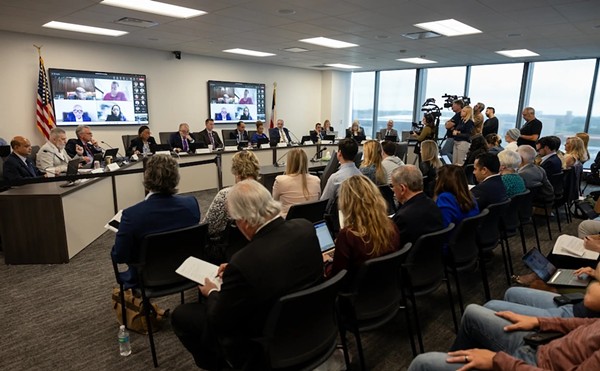Beer drinkers, beer makers, and partisan politicians swarmed the Texas Capitol this month, wringing hands over how to modernize Texas' antiquated beer laws.
Craft brewers, two feuding beer wholesaler groups, beer-loving consumer advocates and representatives of some of the largest brewing conglomerates in the world hammered out a deal that had little to do with grains, hops, water and yeast. This was about money.
What emerged was a compromise, with a Senate committee unanimously passing tweaked versions of five different bills. Proponents and observers say this is perhaps the best chance of passing real beer reforms since the 1993 legislation that first opened the door for Texas brewpubs. The beer bills, now slated for hearing before the full Senate, would allow brewpubs to self-distribute to other restaurants, bars and stores and give microbreweries the right to sell their tap-room visitors a few pints instead of just giving their beer away for free on tours.
"We have a deal signed by all the parties involved," says Scott Metzger, one of the leaders in the negotiations for craft brewers across the state and owner of San Antonio's Freetail Brewing Co. "As long as everyone stays true to their word, this will be the law."
Meaning all parties have agreed they won't quietly deploy a lawmaker to bomb any of the five bills, inserting unacceptable amendments in the final hour that would surely kill the tenuous compromise. The same goes for actions in the House and for lobbying Gov. Rick Perry for a veto.
There is a precedent for distrust.
Five years of negotiations and three legislative sessions led to a measure that would have let microbreweries sell a few to-go bottles to anyone taking a brewery tour. By 2011, the bill looked unstoppable. Even the wholesalers gave their support, with the caveat that mega-breweries were excluded and couldn't benefit from the new law.
Then Belgium-based beer giant Anheuser-Busch InBev stepped in at the 11th hour to spoil the party, protesting the change even though AB InBev hadn't given regular tours of its Houston brewery for 15 years. With lawmakers primarily focused on education funding, it was way too late to make changes and push the measure through to a vote before the end of the session. Some observers at the time believed that the same interests who had only reluctantly supported the bill were trying to kill it behind the scenes.
Now, the slew of bills headed to the full Senate for consideration appear destined for approval, and breweries are talking about future plans as if they've already been signed into law.
As for the compromise bills, there are obvious winners and losers.
Consumers emerged the undeniable winner, since they'll soon have a greater chance of buying their favorite brewpub beer at a specialty store or bar closer to home — even in other cities — instead of only at the brewery where it was made. It could also make brewpubs a more profitable small business, which means we could see more of them.
While this was primarily a business issue, it drew support from craft-beer lovers who want to see the industry grow and bring the diversity that states like Colorado, Oregon and California have enjoyed. Open the Taps, a 2-year-old consumer group, raised more than $25,000 from about 600 memberships ranging from $35 to $100, T-shirt sales and sponsorships. They pooled the money to hire their own lobbyist, someone unbeholden to any of the players.
"That's what we said we'd do from the very beginning," says Leslie Sprague, one of the founders Open the Taps who testified on the bills this month at the Senate Business and Commerce Committee hearings.
Some senators were shocked, Sprague says, to hear her frame beer choice as an important consumer issue. "They just get jaded and cynical because they're used to people being there because of money," Sprague says. "I think that surprised him (Senate Business and Commerce Committee chairman John Carona, R-Dallas) more than anything — that we didn't represent a moneyed interest."
In fact, comments from consumers flooded Carona's and other committee members office's before the bills even got a hearing.
"We have had more feedback on craft beer than we've had on windstorm insurance (one of the biggest issues the committee is tackling this year and of great importance to Gulf Coast counties)," says Steven Polunsky, a spokesman for Carona. Rep. Mike Villarreal, D-San Antonio, had a similar experience when he carried the craft bills in the House two years ago.
A Texas Public Radio panel discussion on Texas beer laws last month drew a packed house, with some 300 people paying $10 to listen to and sample from the state's brewpubs. A pro craft beer rally two years ago drew hundreds to Main Plaza for political speeches and free beer.
This year, even after the compromises, brewpubs scored a major win. They will now be able to produce up to 10,000 barrels of beer a year, something most Texas brewpubs would be hard pressed to do. The typical small brewing system, the kind crammed into the back of a restaurant, generally churns out five to 10 barrels a batch and brews just a few times a week.
With the new laws, there would be incentive to ramp up production. Brewers would be permitted to self-distribute up to 1,000 barrels each year per brewery location to other outlets. If a brewpub has more than two locations in the state, they are capped at a total of 2,500 barrels a year of self-distribution. If they sign on with a distributor as middleman, they can sell even more beer off site.
For some brewpubs, that doesn't fit with their casual restaurant business model. Still, others will pursue expansion, becoming microbreweries and retailers without many of the restrictions placed on facilities with a Texas microbrewery license.
"It's not so much of an economic driver" to be able to self-distribute from a brewpub, Freetail's Metzger says. "It's more of a sales pitch to distributors to show them people want my beer."
There's not much room to add equipment like additional fermentation or serving vessels at Freetail's popular North Side hang out for small-batch beers and brick-oven pizzas, but Metzger says the search is now on for a second location in the San Antonio area. That would allow for a new place with increased production, bottling and deliveries.
"All options are open," he says of what area of the city he has in mind.
If a brewpub does reach its 10,000-barrel a year cap, Metzger says they will have to make a business decision on whether it's worth getting a microbrewery license. The rub is that in most cities, including San Antonio, microbreweries are considered manufacturers and have to set up in areas zoned for light industrial activity, excluding them from the visible retail spaces most brewpubs need to succeed.
The primary thing brewpubs gave up in the compromise bills was the ability to sell beer from other breweries on their guest taps if they chose to self-distribute. Blue Star Brewing Co., the city's oldest surviving brewpub, only sells their house-made brews, and therefore wouldn't feel the pinch.
Metzger says Freetail, which usually keeps several Texas microbrewery guest taps, makes only a little money off of other breweries' beer. Losing that right, however, could have an impact on the future of the annual RealTail festival, which includes rare beers from Blanco's Real Ale Brewing Co.
Wholesale beer distributors also largely won in the compromise bills. The ability for brewpubs to grow and distribute means more breweries will likely hunt for a distributor to handle sales and deliveries, something most brewpubs don't have time for if they are reaching for more than a handful of stores and bars as customers.
Limited self-distribution, rather than hurting wholesalers, actually lets them sit back and watch while brewpubs grow. Eventually, they can pick up the rights to sell the beer after a market is established.
And the wholesalers will benefit at no cost.
Perhaps the biggest win for distributors is that Carona's Senate Bill 639, even after softening during negotiations, gives wholesalers distribution rights for nothing. In fact, the law prohibits breweries from selling their distribution rights to a wholesaler. The wholesaler, however, will own those distribution rights once a deal is struck with the brewer and can resell them. Some in the beer business say they've already started inserting back-door clauses in all their contracts with distributors to get out without a protracted legal battle if the distributor doesn't represent the brand well.
The pro-distributor bill SB 639, considered a "poison pill" by some to force brewers to negotiate with wholesalers, was introduced by Carona. And only through Carona's support could Sen. Ken Eltife's pro-small brewery bills make it out of committee.
Elected state officials have received about $7 million from beer wholesaler interests. Carona, as head of the Senate committee through which most alcohol-related bills travel, received $44,500 in the last decade from the Wholesale Beer Distributors of Texas political action committee. His second largest contributor and largest individual funder at $69,500, is Barry G. Andrews of Andrews Distributing in Dallas, according to a Texas Tribune analysis of filings with the Texas Ethics Commission. Small brewery interests have given just $18,000 and only in the most recent election cycle.
With all of that, it's easy to guess which group feels they got the short end of the stick.
The Texas Craft Brewers Guild, which negotiated as a united front on behalf of its brewpub and microbrewery members, plays its cards close to the chest, but several members say it didn't take long for howls of protest to emerge in e-mails among the membership.
Microbreweries, which often pay for their expansions with money earned from selling distribution rights, will lose that revenue stream if the law passes. Depending on the business potential, distributors have paid from as little as a few bucks per account to seven figures. Breweries can survive and thrive without that one-time cash bump, but say it is much slower going.
The gnashing of teeth began immediately with this missive on Facebook from the new Deep Ellum Brewing Co. in Dallas: "Such a huge step backward for microbreweries. Congrats to the regionals, brewpubs, and most especially the distributors for getting all you wanted. It only cost you ... OUR distribution value! SB 639 is a terrible piece of legislation. To see it now being triumphed as a win for the craft community is an absolute travesty."
The bill allowed only this compromise: breweries can negotiate to share promotions and marketing costs with distributors.
Lee Hereford, CEO of the fast-growing Pedernales Brewing Co. in Fredericksburg has sold distribution rights to its Lobo and Pedernales Classics line of beers to various companies around the state, but is still negotiating others.
"I have a hard time with the concept that my work was worth nothing," Hereford says. Pedernales self-distributed in its early stages and worked to garner 300 accounts at bars, restaurants, and stores. When the time came to use a distributor, they put a value of $50 on each account established by Pedernales. No cash changed hands, but the modest price went back into a kitty for in-store promotions and marketing of the beer by the various distributors from San Antonio to Dallas.
Mark McDavid, a co-owner of Ranger Creek Brewing Co. in San Antonio, says the growing brewery still self-distributes, but their business plan included the sale of their distribution rights when they had enough monetary value to pay for expansions.
If that goes out the window with the new law, then they will have come up with a new strategy.
One of the Senate bills that came out of committee last week would allow microbreweries to sell beer for consumption on premises either during tours or regularly established hours. You can drink beer at a Texas microbrewery (also known as a production brewery to differentiate from brewpubs) now, but they have to give it away. Merchandise and tour charges help offset that cost.
"Do you value the ability to sell pints in your taproom over what you value your distribution rights?" McDavid says is the question he asks himself.
"Limited beer to go given up for the ability to sell pints; wasn't that our compromise? It shouldn't have been giving up the sale of distribution rights," McDavid says.
McDavid says he still thinks the Texas Craft Brewers Guild was making the best of a tough situation in its negotiations and is ready to roll with whatever comes.
"If this legislation gets passed, I would probably hire a couple of part-time people" and upgrade the tasting room, he says. Besides selling beer at weekend tours limited to 50 people and the quarterly open house, which usually draws about 500 visitors, McDavid says he would consider opening the tasting room for three weekdays during set hours for people who might want to stop in for a pint or two after work.
"I think we can make it work and get a little revenue stream going," he says.
Hereford at Pedernales Brewing Co. doesn't think selling pints at the brewery will help him much. The bill, he says, essentially "allows a brewery to become a bar."
"If I had wanted a bar, then I would have built a bar," Hereford says. "To be able to sell a pint at the brewery, how does that help me?" Selling take-home beers after a tour does more to build buzz and loyalty, he says. Plus, it would have been the best thing for consumers, distributors and the breweries.
"At the end of the day, we didn't get what we needed," Hereford says.
San Antonio's Busted Sandal Brewing Co., which is set to start brewing later this year, won't benefit much from changes, says co-founder Robert Garza. But the new laws are making them re-think their strategy. Now they want a distributor quick, which won't hurt them economically if the distribution rights lose their value anyway.
Jason Ard, owner of Branchline Brewing Co., says little was gained. San Antonio city ordinances governing the location of his Northeast Side brewery may not allow him to sell pints to customers if they set up regular taproom hours.
Microbrewery and brewpub owners hope that some city policies can be changed as the need arises to be friendlier to their circumstances such as granting variances to retail brewpubs that become microbreweries and letting microbreweries sell beer retail at their industrial sites. Alamo Beer Co., last year, worked with the city to clarify city codes to make sure it could build a planned brewery on the near East Side.
"Selling pints is not doing a thing for a brewery like mine," says Anna Kilker, who launched Guadalupe Brewing Co. in New Braunfels with her husband Keith. "We don't have the glasses or the staff to handle that. It's enough just to keep our kegs clean and make deliveries."
Microbreweries did get the right to self distribute up to the 40,000 barrels of beer a year, but few want to keep that labor-intensive task in-house beyond a few thousand barrels. Another new twist in the legislation is that small out-of-state breweries could qualify to self-distribute limited amounts in Texas.
Julia Herz, director of craft beer marketing for the Brewers Association, lauded the Texas brewers group for getting something even this far along.
"It's admirable to get something done," she says. "Every market has moved at its own pace, but Texas is one of the last frontiers to conquer," she says of a state mostly resistant to modernizing beer laws in place since Prohibition was lifted.
She says if these laws pass, "it helps further these breweries' chances and perhaps creates Texas as even more of a destination for beer."

















